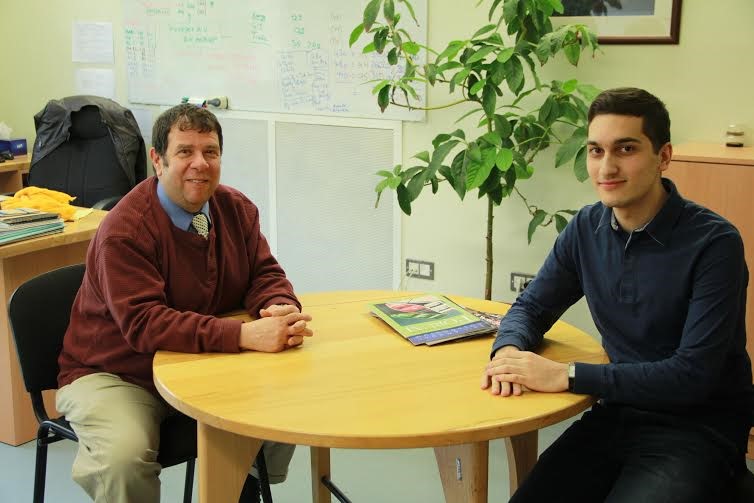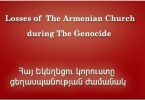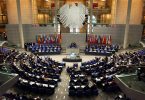Armenian Genocide 100 Years Later: Changing Priorities from Condemnation to Compensation
posted on APRIL 15, 2015 by THEBRIDGE
An in-depth interview with Dr. Thomas Samuelian about the issues concerning the legal aspects of overcoming the Armenian Genocide consequences and international legal accountability for the Genocide.
– From the legal point of view, what are the key issues and aspects of overcoming the Armenian Genocide consequences?
– Genocide is a crime against humanity. Like all criminal acts, condemnation and punishment is the right and duty of the community, here, the community of nations. That’s the criminal part. There is also a civil part, i.e., the damage to the Armenian people. Reparations are compensation of harm. It is an inalienable right of the injured party, founded on independent factual and legal grounds. It is the duty of the community to assure and the right of the victim to receive compensation.
– How would you assess the issue of modern Turkey’s responsibility?
– Under international law, the basic rule of compensation is restitution – to put the victims in the position they would have been but for the crime, or to make the victim whole. Another way of putting it is that reversible harm should be reversed. Irreversible harm should be compensated.
This is distinct from criminal liability. Even if Armenians and Turks agree to let bygones be bygones, they cannot agree to make a crime go away. A crime was committed, whether or not it has been duly prosecuted or universally condemned, impunity creates a bad precedent for which we all pay. Victims cannot bring charges or absolve perpetrators or beneficiaries of crimes. That’s the right and duty of the community of nations.
That said, Turkey is in an untenable position, half condemned, but unwilling and uncompelled to admit guilt and atone, while kept in limbo by the US, Israel, England and other world powers who at least publicly hinder Turkey from finding a redemptive exit from this predicament (probably because of mutually reinforcing benefits of denial and delay). Moreover, there is no clear way out other than (1) condemnation by the international community (read: the holdouts – US and England), or (2) Turkey’s admission of guilt.
On the civil side, under both treaty law and international court rulings, Modern Turkey is the same state as the Ottoman Empire. Turkey itself accepts this through the Treaty of Lausanne. Modern Turkey is clearly responsible for what happened and has benefited greatly from the crime. There should be no confusion about Turkey’s involvement: it is still the same country. So, there is no question concerning Turkey’s liability, based on international law and practice. But Turkey did not cause the harm to the Armenian people alone. The Great Powers created the conditions and deprived Armenia of compensation at the time, and have continued to delay just resolution for their own interests. There is a saying, justice delayed is justice denied. Many have caused or benefited from the crime at the Armenians’ expense. All owe compensation.
– What legal aspects can Turkey use to remunerate Armenians’ material and financial losses during the Genocide?
– There are a number of different methods. We can go back to 1919 and see what the Armenian proposal was at the Paris Peace Conference, namely, a combination of monetary compensation for irreversible harm and return of lands and property. The total harm as of 2015 has been calculated to be in excess of $3 trillion, which can be paid in cash or kind, over time. By kind, we mean land restoration, property restoration, mineral rights, access to the sea, rights of way, free ports, water rights, etc. So the actual settlement could be paid in reasonable amounts over a number of years out of future cash streams.
Additionally, Turkey was not alone after all. It had direct allies like Germany and Austro-Hungary and other indirect allies like England, France, Russia or Italy, later on the United States and Israel that in one way or another have contributed to the Armenian Genocide Predicament we find ourselves in. Certainly, all these countries played a role in delaying compensation. More than that, Germany is known to have played a major role in the planning the genocide and failed to intervene to prevent it, as the Germans knew very well what was going on. It took a lot of countries to make the Armenian Genocide Predicament and it will take the combined efforts of many nations to resolve it.
– How would you evaluate the possibility of returning of lands from the legal viewpoint?
– Occasionally international courts adjust borders, but it is unlikely that a court will rule to restore a homeland, when it lacks the power and authority to enforce the ruling. So, this is the problem of the international law or the legal framework generally. The issue of compensation in case of the Armenian Genocide is a hard one. The international community lacks adequate mechanisms for redress; nevertheless, for resolution and closure it is important to state the full extent of the harm. The system of international institutions has not been very effective in condemnation of genocide as a crime and less effective at compensation or preventing such crimes. This is not surprising given the bad precedent of the Armenian Genocide. Turkey continues to enjoy the fruits of its crime with impunity. This precedent is a catastrophe for the community of nations and humanity.
As for civil claims for recovery of property, legal processes are available for private claims to recover private property, for example, Turkish courts, or the courts of other countries, or in some instances, the European Court of Human Rights. There are hurdles and legal complexities to these cases, including procedural and evidentiary issues, but in some cases, these can be overcome and in others, international courts do justice in spite of legal impediments. The Armenian Church obviously is in a unique situation because it is an institution that was recognized in the Ottoman Empire and continues to exist. Its rights are comparatively clear and well documented, and often in such situations, cultural and religious property claims are the first to be resolved, because such rights are so public. That is why the Armenian Church has a good case (as do other churches, including the Greek, Roman Catholic, and Protestant Churches), for return of church lands and properties.
– What judicial means could be used in the compensation process? For instance, European Court of Human Rights, UN’s International Court…
– The European Court of Human Rights (ECHR) is not directly accessible for individuals: people have to first sue in courts of a member country, such as Turkey, in order to appeal to the ECHR. That is one option. Still these are not Genocide claims per se. These are private wrongful takings claims.
States can sue in the International Court of Justice (ICJ), but the party being sued (Turkey for example) would have to agree to be a defendant, which is unlikely. There is also the International Criminal Court, which would typically handle genocide claims, but this is also problematic. To start, Armenia is not a member of the ICC. In short, there are problems concerning both jurisdiction and standing in international forums, which is one reason why the Armenian Genocide Predicament has persisted unresolved for so long. If there were a straightforward solution, it would have been pursued and resolved by now.
– How would you evaluate the non-judicial ways of compensation of damages?
– It is much more likely that there will be an extrajudicial, non-court settlement through negotiation in a bilateral or multilateral framework including Turkey and other countries that were involved either in the perpetration of the Genocide, or the delay in redress. If this issue had been settled in 1919, there is good reason to believe that the Jewish Holocaust and even perhaps WWII would not have occurred. There is a direct line between what happened to the Armenians and Germany’s WWI policies and strategies in the Ottoman Empire as well as the later Holocaust. Impunity is the greatest danger.
Turkey needs to get out of this indefensible situation and face the reality. They contend that whatever happened was not genocide. Well, even assuming it was not genocide, it is still a crime against humanity, even if it is not crime against humanity it was horrible atrocity in contravention of international norms. The result is the same. The Armenian people were exterminated and removed from their lands and Turkey and the Kurds directly benefited and many other countries indirectly benefited from this crime.
– What about world powers’ position concerning the issue of eliminating the consequences of the Armenian Genocide and Turkey’s accountability and responsibility?
– Some very important countries have recognized the Armenian genocide and no country, including Turkey, denies something horrific took place. Very few, however, have drawn the logical conclusion of recognition, which is that Armenians are due compensation. Condemning a crime without any sort of consequences is an empty act. In a way, it is more dangerous to condemn with impunity than not to condemn at all. If the crime is admitted, then something must follow in order for there to be closure, atonement and redemption. The perpetrators need this even more than the victims. Punishment, compensation or both are essential to recognition.
Armenia has taken many steps to resolve this issue. However, the resolution is not in our hands. As noted earlier, it is the community of nation’s right and duty to prosecute crimes. This problem does not have a clear solution. We are exploring different possibilities as a state and as a nation to find a solution to a problem that does not have a ready-made solution.
In 1915, everyone promised that they would act against “crimes against humanity” and then 1919 came and instead of acting everyone went for their own interest. The Russians went for their interests, English, French, Americans, and Italians. Each in its own way left the issue unresolved, often making matters worse, and that is why we are living with this predicament, which is a burden for Armenians and for the world, and also for Turkey.
We don’t want to be treated as a pawn or leveraged for others’ interests. The Turks are tired of being reminded at every turn that there is this unspeakable issue which has not been resolved. There is personal shame or public shame, and there is fear as well of being unmasked or being someday called to account. This is captured in a wonderful Armenian saying: “An uneasy conscience betrays itself.” – “Գող` սիրտը դող”. Being in limbo makes Turkey inherently unstable and unpredictable. That is beneficial for nobody. This must be resolved so that neighbors are not haunted by the past. The truth will set us free.
Thomas Samuelian is the dean of the College of Humanities and Social Sciences and the Accreditation Liaison Officer at the American University of Armenia (AUA).
Gabriel Hovhannisyan






